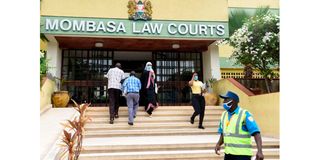Lobby challenges constitutionality of Taita Taveta County Assembly

The Mombasa Law Courts
A lobby championing the welfare of disabled people has challenged the constitutionality of the new Taita Taveta County Assembly, claiming it does not include anyone from among them.
In a petition at the High Court in Mombasa, Taita Taveta Walemavu Sacco also wants the judge to interpret whether the assembly is legal and constitutional if it does not include people with disabilities.
It wants the court to rule that failure to select to the assembly people with disabilities from party nomination lists is retrogressive and contrary to the Constitution.
The Constitution requires that the state ensure progressive implementation of the principle that at least five per cent of elective and appointive positions go to people with disabilities.
“[The] Composition of the county assembly under Article 177 (1) (c) of the Constitution requires that it [include] among others persons with disabilities,” the petition states.
Taita Taveta Walemavu Sacco also wants the court to declare that the county assembly as currently constituted (without disabled people) violates articles 81,90,100,177 and 232 of the Constitution is thus unconstitutional.
The group has sued the Independent Electoral and Boundaries Commission (IEBC), the Taita Taveta County Assembly and its Speaker, Mohamed Omar, Patricia Chao, Rose Mwatumbuchu and Josephat Peter Shambi.
It names Cyril Mwanyuma, Thomas Mwaisaka, Hanna Namvua (who have disabilities), the National Council for Persons with Disabilities, the Wiper Democratic Movement and the Orange Democratic Movement as interested parties.
It also argues that the Elections Act requires political parties to nominate for appointment to county assemblies people with disabilities through allocation of special seats.
It says Mr Mwanyuma, Mr Mwaisaka and Ms Namvua were selected for nomination to the assembly under the category of persons with disabilities in order to comply with the Elections Act.
Though the three were listed, the petitioner says, the IEBC, in a September 9 Kenya Gazette notice, failed to include them as members nominated for the special seats though the names were forwarded by their respective political parties.
The petitioner argues that the IEBC listed four others who are not persons with disabilities though the Elections Act is clear that in the nominations, priority should be given to the disabled.
“The consequence is that the county assembly as currently constituted is bereft of persons with disability or any of their representatives [and] hence [is] unconstitutional,” the petition states.
The petitioner also argues that constitutionality of the county assembly is not just an election dispute but a constitutional question of public interest and importance.
By failing to prioritise the three people with disabilities in selecting from a party list, the petitioner argues, the IEBC violated various provisions of the Constitution.
The petitioner wants the court to quash the September 9 gazette notice.
It also wants the court to order the IEBC to amend the notice by replacing three nominated individuals with those with a disability.





